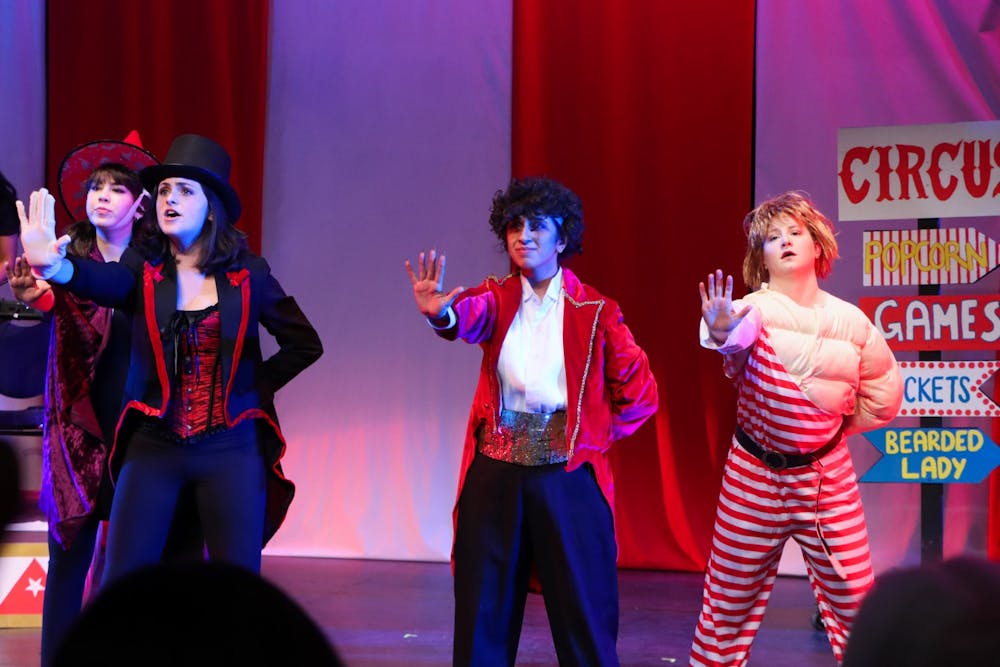In 2020, Harvard rescinded its controversial ban on single-gender organizations, which included fraternities, sororities, final clubs, and other social clubs. First implemented because of the discriminatory nature of these clubs that may alienate those who do not abide by the gender binary, Harvard officials rescinded the policy on the basis that it may be legally discriminatory on the basis of sex.
Gendered spaces dominate campus life, both in social aspects and the physical space they are able to occupy on campus. Although Harvard rescinded its ban on the grounds of discrimination on the basis of sex, it is time we recognize that single-gendered clubs should no longer exist in 2021.
We’re taking steps in Bloomers to move away from female-centric language and our all-female past, and this past semester we transitioned to becoming a group for all gender minorities in comedy. We hope this will make our group more inclusive and welcoming for gender non-conforming and transgender communities who shouldn’t be barred from sketch comedy groups at Penn because they don’t fit into the stereotypical cis-male or -female boxes. It’s not a walk in the park, and it’s honestly very surprising how many of our traditions and activities have gendered undertones, but we’re a work in progress and that’s more than we can say of ourselves in the past. By creating a space where we can challenge group norms and openly discuss what makes us uncomfortable, Bloomers has started to feel more like a home than it ever did before.
Many critiques of this policy and our recent transition center around the idea of an all-female space, that women would be more comfortable and empowered in the presence of other women, a valuable experience that may be at risk if clubs were to become co-ed. However, these critiques operate on the assumption that these safe spaces are inclusive as well, while they tend to be anything but. For example, sororities tend to promote the idea of sisterhood and empowerment in the presence of other women. However, these spaces can be expensive and excusing of certain behaviors that may be alienating to other marginalized groups. Yet, these very clubs are validated on the premise of providing a safe and empowering space while also only catering to a single gender. Imagine if we were able to accommodate those who do not abide by the strict expectations set by the gender binary or single-gendered clubs.
The University of Pennsylvania is far from promoting inclusivity, especially in student organizations. Gendered groups, a relic of a more intolerant past in a university with all-male origins, continue to exist within and thereby perpetuate the gender binary and paint our diverse and wonderfully colorful student body black and white. Greek life is often the poster child for arguments like this, but a blind eye shouldn’t be turned on the gendered clubs that don’t fall within Greek life, especially within the performing arts community at Penn. Restricting entrance into a group on the basis of gender has little benefit in the way of producing content and many times even hinders the success of what they create.
Obviously we’re not saying that every gendered group on campus needs to change their entire dynamic, nor are we saying that this measure would abolish the gender binary at Penn. However, we do have the power to open our spaces and make ourselves more of a welcoming community. Every student here is a part of some campus community, and every single community should rethink the way it defines itself, especially if it does so in a single-gendered manner, and strive towards being more accommodating of all students.
That said, there is still a lot of work to be done when confronting single gender groups and striving for change. Becoming co-ed or attempting to loosen the gendered foundation of your organization isn’t enough to rectify a past of active discrimination against marginalized communities and, frankly, it’s a solution that reeks of performative activism. There also needs to be a fundamental change in the group itself and how we critically engage with the institutional discrimination they themselves have perpetuated. Becoming co-ed at the snap of your fingers will not automatically make a space more welcoming and inclusive for others. Actual work needs to be done with the space and the very people who occupy these spaces, otherwise such groups may continue to perpetuate a toxic environment under a performative, progressive banner.
Strict gendered clubs should have no space at Penn. But if you do happen to exist within communities that define themselves by gender, there are always methods to promote inclusivity, even if it’s baby steps at first. There’s a lot more work to do before the gender binary stops being such a pervasive part of the Penn community, but for now take action in any way you can. You’ll be surprised what a world of difference it can make.
Shriya Beesam and Ashna Yakoob are the co-inclusion chairs of Bloomers, Penn’s sketch comedy troupe for gender minorities. They are holding auditions on January 31st and Feb 1st. Visit our website/social media or email rbrac@sas.upenn.edu for more information.









